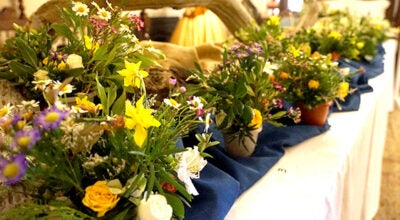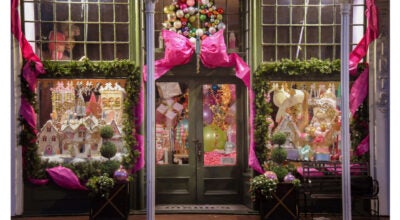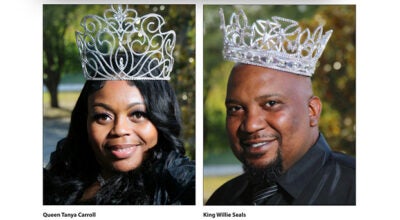What’s in a name? House names add personality to Natchez
Published 11:59 pm Saturday, February 23, 2013
In Natchez, unlike in Shakespeare, a name is everything.
A rose called by any other name may smell just as sweet, but not in a city whose character has been largely shaped by its history and its houses. Some Natchezians might even say the names of Natchez’s houses are a big part of the Natchez story.
Historic Natchez Foundation Executive Director Mimi Miller said the tradition of naming houses in Natchez came about from the English tradition of naming estates.

Jay Sowers / The Natchez Democrat — Colleen Wilkins stands with her shih tzu, Lilly, in front of her home, Rosehill Cottage, of Auburn Avenue in Natchez. Wilkins has planted some 50 rose bushes around the home.
“I don’t think it’s a matter of being pretentious; it’s part of the whole tradition that has developed in Natchez,” Miller said.
J.H. Ingraham pointed out in his 1835 book “The South-west Vol. 2” that in Natchez, names of houses are regarded by the community as an “inseparable part of their address.”
Names will always be an inseparable part of the identity of Natchez’s houses and their properties, Elms Court owner Anne MacNeil said.
Before Elms Court had an address, she said, it had a name.
“Before there was a 545 John R. Junkin Drive, there was Elms Court,” said Anne MacNeil, whose family owns Elms Court. “Before you had real street addresses, the houses were named, and people knew where they were because of their names.”
MacNeil has a couple of theories on the origin of the name of her house.
The two women who built Elms Court, Katherine and Eliza Evans, also lived at The Elms.
“A theory is that it is somehow related to that,” MacNeil said. “There is also a large number of Elms on the property, so it could also be named for that reason. We don’t have any documentation that tells us why the house was named Elms Court.”
Like Elms Court, Miller said, many houses in Natchez share names with topographical features of their properties, such as trees. Others are named for their original owners, such as Stanton Hall for Frederick Stanton.
Melrose’s name does not come from a tree, a flower or its owner, it comes from a poem.
Natchez National Historical Park Superintendent Kathleen Jenkins said Southern planters were enamored with the works of Sir Walter Scott, a Scottish novelist, playwright and poet, including John McMurran, who built Melrose in 1845.
McMurran and his wife, Mary Louisa, were inspired, Jenkin said, by Sir Walter Scott’s description of Melrose Abbey in his poem, “The Lay of the Last Minstrel.”

Jay Sowers / The Natchez Democrat — Anne MacNeil stands in the foyer at Elms Court antebellum house in Natchez earlier this week. The house has been in her family since 1895.
The McMurrans also took a grand tour of Europe, Jenkins said, in 1854 and made a special point to visit the ruins of Melrose Abbey.
But the tradition of naming houses has become so inscribed in Natchez culture that it has lasted far beyond the 1800s.
Colleen Wilkins bought her Auburn Avenue house in 2007, fixed it up and gave it the name Rosehill Cottage.
But Wilkins did not pull the name out of thin air for the 1950 house that sits on a small hill. She planted more than 50 roses, mostly Knock Out roses, in 2007.
“That’s how the name Rosehill came about,” she said. “In naming this little cottage, it has given me the symbol of who I am and what I believe. I believe naming your house tells a little lesson in history, like reading a book or putting a puzzle together.”
Wilkins said she believes the Natchez’s visitors also enjoy the names of Natchez.
“It gives the houses a personality,” she said. “It makes our community personal and friendly, and I think visitors really love it.”
But naming houses is not a tradition unique to Natchez, Miller said.
“Charleston and Savannah and other historic places do it too,” she said.
And the tradition of naming houses has also found its way to places close to Natchez.
Lake St. John is also known for its array of lake houses and their interesting names.
“I think it gives the lake character,” said Fred Voss, whose family has owned their house named Del-Sa-No on the lake since 1945.
Voss’ family’s lake house — Del-Sa-No — is named after his mother, Delphine, whom everyone called Del. Voss’ father, Axel, bought the property in 1945 and built the house.
“Daddy wanted to buy it, and she said, ‘no.’ I think he had already purchased it then,” Fred said laughing. “So he named it Del-Sa-No because she said, ‘no.’”
Voss has fond memories of growing up at Del-Sa-No. His family spent every weekend there during the summer.
“We would swim and fish and get sunburned,” he said smiling. “We would get boats and paddles and take off and be gone all day.”
Voss said there are houses on Lake St. John that have changed hands through different families, but the house name still remains the same.
“For years, we knew just the house names but not who owned them,” he said.
The same is true in Natchez, Miller said, because owners change, but house names usually do not.
“It’s good to have names for the houses,” Miller said. “You can’t keep people forever, but you can keep the houses.
The names of Natchez houses, Miller said, have become ingrained in the identity of the city.
“In Natchez, the houses are the constant,” Miller said. “We dance around them when we’re alive, and then when we’re gone, they’re still here. They’re a part of each of us.”






